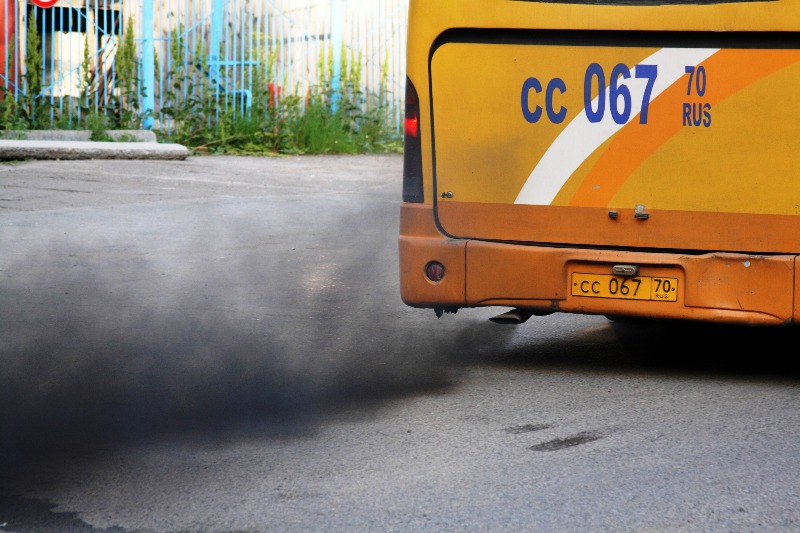We are increasingly solicited and sensitized to the air quality, and the car is often denounced as one of the most polluting factors by the exhaust of black fumes. What are the causes of these fumes, and how to solve the problem? Read this post to learn all about the black smoke exhaust.
Black smoke exhaust: symptoms and mechanism
What are the signs of black smoke production?
Dense, black fumes coming out of the exhaust pipe? The emissions occur mainly during acceleration, and the vehicle’s rear gradually turns black (especially for diesel engines).
Fuel consumption can be high, and power losses under acceleration or high load can also occur.
Did you know? Blue or white smoke from the exhaust is also sometimes seen.
How does black smoke occur?
Black smoke is caused by engine enrichment. For good combustion, the mixture between the oxygen in the air and the fuel is carefully balanced: too much air (or not enough fuel) and the combination is poor, not enough air (or too much fuel), and the mixture is rich.
In the latter case, the combustion is not complete, and the unburned gases come out of the exhaust in the form of black smoke.
Black smoke emission from all engines
– The vehicle typically runs at idle, but the smoke appears at full acceleration, and the engine may even choke and lose power; it lacks air, and the first thing to check is the condition of the air filter, these symptoms being typical of a clogged filter element.
– Smoke is present at all engine speeds, the idle speed is unstable, and the diagnostic light comes on; the engine speed may also be limited: the engine temperature sensor is likely defective (the sensor that allows the engine to be enriched when cold). The engine management module then adopts an emergency strategy by taking an arbitrary engine temperature value.
– Black smoke occurs at idle and not necessarily (or much less) at full load: an injector is likely to seize, send too much fuel and not vaporize the air + fuel mixture (deficient jet).
Black smoke emission and gasoline engine

– The vehicle runs very poorly at idle and in rpm with high fuel consumption (vehicle equipped with a carburettor or an old generation injection): an enrichment or return pump diaphragm is pierced for a car with a carburettor or the pressure regulator diaphragm at the end of the fuel rail is pierced for a vehicle equipped with an injection. In both cases, the gasoline passes through the vacuum channel and is sucked in by the engine.
– The black smoke is low, the fuel consumption is high, and the gas analysis shows a high CO (carbon monoxide) content: the operating pressure of the indirect injection is too high (nominal value: 2.7 to 3.1 bar) due to a deficient pressure regulator.
Black smoke emission and latest-generation diesel engine
In the latest generation of direct injection rail diesel engines, the idle speed suddenly becomes unstable and black smoke is produced. At the same time, orange or yellow light comes on the dashboard. The malfunction lasts about 10 minutes and then disappears.
No need to panic! This is a regeneration of the particulate filter. For several thousand kilometres, the filter, located on the exhaust line, stores the particles emitted by the engine. When it is saturated, the engine management unit starts a regeneration procedure, which involves injecting an overdose of diesel (or diesel fuel). The unburned diesel fuel accumulates in the Diesel Particulate Filter (DPF) and ignites, burning the particles.
Black smoke emission and old gasoline and diesel engines
This type of smoke production applies to non-catalyzed indirect gasoline injections (until 1993) and mechanical direct and indirect diesel injections (until 2002). These emissions occur in mountainous terrain as the engine gains altitude.
The power drops sharply; this symptom is due to the scarcity of oxygen which enriches the combustion (too much fuel compared to the air). The descent to lower altitudes suppresses the phenomenon.
Prevent black exhaust fumes. Yes, but at what cost?
There are many causes of exhaust fumes, and the cost of repair varies. Here is a non-exhaustive list of some of the most common causes.
|
The part related to the origin of the smoke |
Approximate cost of parts |
Labour time |
|---|---|---|
|
Air filter |
$15 à $50 |
15 min |
|
Temperature sensor |
$20 à $70 |
30 min |
|
Fuel injector (unit) |
$50 à $250 |
1 h |
|
Diesel injector (unit) |
$200 à $500 |
1 à 4 h |
|
Carburettor diaphragm kit |
$10 à $40 |
30 min à 2 h |
|
Fuel pressure regulator |
$50 à $250 |
30 min |


